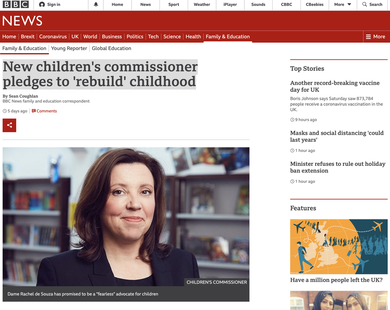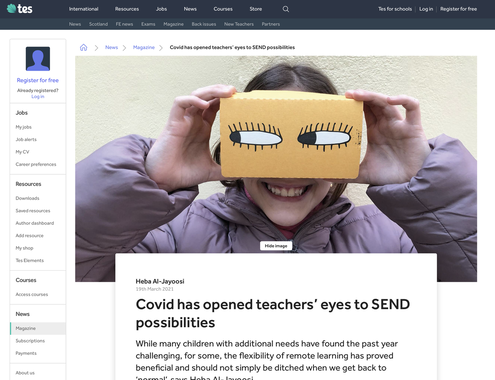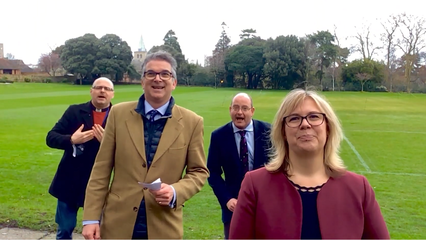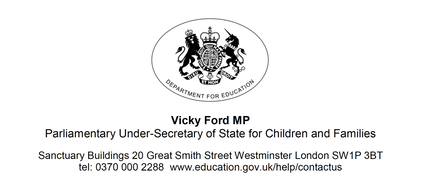|
Douglas Silas, Specialist SEN Solicitor 29th March 2021 Hi Sometimes you can't do everything that you want to... I'm afraid that I have realised that I am going to be unable to get my 'SEN Update' to you this week. With a day off for religious reasons, a day-long hearing and another day off on Good Friday (as well as several other matters to deal with), I knew already last week that I would not have the time to do everything that I wanted to do, even if I tried. I actually wrote this last Wednesday - see, it pays to look ahead! Anyway, I have still included a cartoon for you as usual, which I hope you will enjoy. I will catch up with you I hope next week (although on Tuesday, because it is also Bank Holiday Monday next week). Hope that you have a good and productive week (you probably will also need to squeeze 5 days into less!) Keep safe. With best wishes Douglas P.S I understand that there are many educational items, news articles, or other useful resources on the web, so I would be very grateful if you could let me know of any that you find that you think that others may find useful, so that I can direct people to them.
Douglas Silas,
Specialist SEN Solicitor 22nd March 2021
You can see a lot when you just watch!
Seems really obvious doesn't it, but you will be surprised at how often we fail to notice what it right ahead of us and sometimes staring us in the face. And sometimes the reason we don't see things coming that we should do, is that we are usually too wrapped up in thinking our own thoughts, or spending our time telling other people what we think (whether or not they have asked us!) Another very common reason why we don't see things sometimes, is that we fail to spot patterns repeated by other people, or in repetitive situations. If we don't want to believe something, we often, subliminally, try to convince ourselves that what we are seeing is not really happening (or is not happening again). We don't see the patterns of behaviour at play. It is like we are sometimes in denial and do not want to unconsciously face up to the truth or reality. Yet, in the end we always try to comfort ourselves, by telling ourselves that, deep down, we always knew it and we should have trusted our gut instincts, or have people around us telling us (albeit with the best of intentions) that: "I told you so", which then just makes us feel even worse, or even more defensive. Again, it seems obvious, but we can often notice things if we just look at them more closely and think about them. Like someone once said (and apologies if you have heard another version of this before) - if it looks like a duck and it acts like a duck, it probably is a duck! In this week's SEN Update you will find information about:
I know how busy everyone always is, so please feel free just to read the sections that are of interest to you or read everything; the choice is always yours.
Don’t forget, to ensure that you never miss one, you can get my SEN Updates personally by completing your email details above,
or by following me on one of the social media platforms I use (i.e. Twitter/Facebook). You can also share this SEN Update with others (please only do so if it may be relevant to them) by using one of the icons, usually to the right or at the bottom of this page.
NEW CHILDREN'S COMMISSIONER
After I said in my SEN Update at the beginning of last week that there was not a lot of news to report the week before, the past week has now made up for it with lots of news and articles! So today, although, as usual, I am going to still share a few new stories which I found of interest, in the third section of this update, I want to use the first two sections to look at some of those stories in more detail. The first bit of news I want to share with you is the appointment last week of Dame Rachel de Souza, as the new Children's Commissioner for England (I shared some departing words from her predecessor, Anne Longfield, a few weeks ago). Although widely covered in the media, I can do no better than to quote from the BBC's website article entitled: 'New children's commissioner pledges to 'rebuild' childhood', which said: 'The new children's commissioner for England wants to "rebuild childhood" after the disruption of the pandemic. Dame Rachel de Souza says the scale of the challenge is like reconstructing the social security system in the wake of World War Two. She also wants short-term measures - such as free school meals - being extended into the summer holidays, and not "dropping" Universal Credit levels. Dame Rachel says she will be "fearless" in representing children's interests. The new children's commissioner is launching what is claimed to be England's biggest survey of children - the "Big Ask" - which will gather children's views on the impact of the pandemic, and what they think are the barriers to children's ambitions 'Once in a generation' The online survey, to be sent to all schools and also children in youth custody, children's homes and mental health units, will provide information for a "once-in-a-generation" review of how children's lives might be improved. It takes its "spirit and the ambition" from William Beveridge's 1942 report, which laid the foundations for the post-war welfare state, identifying the five great challenges as "want, disease, ignorance, squalor and idleness". "Our response to the trauma of the Second World War was to create a blueprint for a social service system and a National Health Service that improved our lives. We have the chance to do the same again now for children," says the children's commissioner. Dame Rachel, who ran schools in Norfolk and Suffolk, wants a 10-year plan to emerge from her review - with the promise of tackling a political system which can "often short-change children". For more immediate challenges, on whether free school meals should run across the summer holidays, she told the BBC: "I absolutely want to see free school meals extended. "And I'm very concerned about suggestions of dropping Universal Credit. If it was dropped down again, I'd like to see services provided in its place, but I'd rather it wasn't dropped." A former teacher, head teacher and chief executive of a school academy trust, Dame Rachel promised to be an "independent voice, there to fight to protect and promote the rights of children". If government was "doing something wrong", she said, "I will be fearless in exposing that and challenging them". 840 million missed days in school The review will consider how children will recover from so much disrupted education - calculating that collectively pupils in England have lost 840 million days of in-person schooling since the start of the pandemic, representing about 19 weeks each. It will address the "social fault lines" and inequalities that have been exacerbated by the pandemic, between generations, the wealthy and the disadvantaged, by ethnicity and geography. This includes how the gulf between rich and poor and young and old has widened, with older, higher earners increasing their savings in the lockdown, while poorer families and younger people have faced job losses and increasingly fragile finances. Today's young people are the first post-war generation to be less well-off than their parents, says the report launching the children's commissioner's review. Catch-up funding "As we emerge from the Covid pandemic, this is the moment for something big, for children to recognise the sacrifices they have made," said Dame Rachel. "I have seen first-hand the effect of this crisis on young people's hopes and dreams, and sometimes our answers simply have not been good enough." Labour's Shadow Education Secretary Kate Green said: "Over the last decade the Conservatives have overseen record numbers of children being pushed into poverty, a worsening mental health crisis and an 18-month gap in learning between disadvantaged children and their peers at GCSE." A Department for Education spokeswoman said: "We know that children and families have faced unprecedented challenges during the pandemic. "We've expanded frontline charity support and provided new resources for schools and teachers to support children and young people's mental health. "Our £1.7bn investment in recovery support will help tackle the impact of any lost learning and we are investing an additional £79m to increase the number of mental health support teams working with schools and colleges."' There was also a video, which you may find of interest to watch...
A NEW WAY FOR SEN?
The second bit of news that I want to share with you is an article written for TES by Heba Al-Jayoosie, who is assistant head (Inclusion) at Mayflower Primary School in London, entitled: 'Covid has opened teachers’ eyes to SEND possibilities'. I would usually just suggest you click the link to read it if you want to, but since it is so insightful, I thought I would quote from it here fully, as follows: 'The pandemic has been hard for everyone but, for many pupils with special educational needs and disability (SEND), and their families, the past year has been particularly challenging. Many of these families already felt marginalised and the sudden shift to remote learning exacerbated difficulties for some.But there were also pupils with SEND who adapted really well to the change, with schools demonstrating creativity and flexibility in meeting their unique needs. So, what has the past year taught us about effective SEND education? And how could this help us to change provision for good? Working collaboratively with families has always been crucial and the pandemic has highlighted just how important school-home collaboration is. In trying to plan any kind of provision for pupils with SEND during lockdown, schools needed to know each individual’s strengths and challenges, as well as the context of their family. SEND support This meant answering countless questions: is school or home more conducive to learning? What about the wellbeing of the child? What can the child do independently? How can we use the parent/carer strengths? What resources are needed? These are questions that continue to matter at all times, not just in the midst of a pandemic. And the solutions that schools devised during lockdown show how we can use such questions to tailor our support. Some children had home programmes that their families were able to help deliver and many schools were able to lend resources, including gym equipment. Interventions such as reading recovery, speech and language or occupational therapy are an essential part of provision for many, and teletherapy offered a successful way of delivering some of these remotely. Those who may have struggled with sensory overload in a regular class enjoyed learning from the comfort of home. The ability to take part in class discussions using the chat function helped many to make extended contributions (much more so than they may have made in class). Many teachers also planned specific online times for social connection, and the clear rules and codes of conduct were reassuring for some SEND students, particularly in comparison with a busy playground. Asynchronous online teaching also brought benefits, enabling students to repeat lessons as needed, as well as working to flexible deadlines, giving them more control of their day. While it might not be easy to replicate all of these benefits in the future, it certainly shows what can be achieved if we take a more flexible approach. Perhaps, for instance, a blended model combining in- and out-of- school learning will really become a feasible option for some pupils. The pandemic has forced us to rethink how we do things for pupils with SEND – and has given us fresh insight into what matters most for these pupils and their families. We’ve seen benefits and disadvantages, but there can be no denying that it has opened our eyes to what is possible. I hope that the biggest takeaway from this past year is that we can be more flexible than we used to be. As much as we all want things to return to normal, I’m hopeful that “normal” can become something better than it was before.'
LATEST NEWS ONLINE
In terms of other news articles, here are the others I found of interest: - School attendance back at high levels in England - Schools Covid catch-up programme 'not reaching disadvantaged pupils' - Teachers face 'epidemic of demotivated children' - Families facing special education needs 'postcode lottery' - Pupils in England less likely to get special needs support in poorer areas
Where can I find further information?
Again, aside from clicking on the relevant links for more information, I would also remind you of the very useful resources and information provided on the following websites: - IPSEA - Council for Disabled Children - Contact - Scope - Special Needs Jungle I would also highlight again the fact that you can now get a digital copy of the magazine: Autism Eye which is very helpful to any parents or professionals involved with children/young people with Autism. Keep safe until next week. With best wishes Douglas
P.S I understand that there are many educational items, news articles, or other useful resources on the web, so I would be very grateful if you could let me know of any that you find that you think that others may find useful, so that I can direct people to them.
How useful do you find my SEN Updates?
Created with Quiz Maker
Douglas Silas,
Specialist SEN Solicitor 15th March 2021
Too often, I find that we wish for something, but when our fantasy becomes reality and we eventually get it, it then actually does not make us as happy as we thought it would.
In fact, sometimes when we get something that we previously wished for, it can actually make us unhappier than we were before (as our expectations have then been boosted unrealistically, so we then have farther then to come down)! We regularly let ourselves drift into fantasies in our minds, imagining that doing this or that, or getting this or that, will somehow magically take us away from our everyday realities. I am all for visualisation of success, but am always very clear to always point out to anyone who asks me that visualisation alone is not sufficient and you always need to also put in good old fashioned hard work behind the scenes constantly (and often for many months and years) perfecting a skill privately, before the rest of the world sees you succeed publicly; and even then you need to again concentrate on the next thing to achieve. Like I heard someone say once, everybody wants to succeed, but not everybody (often very few people in reality) are prepared to do what it takes to succeed! Unfortunately, our society seems to be fixated on so many things that aren't real - whether it is an everyday fear of missing out (FOMO), just because we think that other people are doing better than us in life (which is usually not the case in reality, as they are usually just good at giving others that impression, by hiding away their difficulties), or because we try to believe what we see on-screen or in the movies, where everything always seems to work out for the best in the end. But that is just fantasy, not reality. So, whilst I always encourage people to pursue their dreams, I need to warn you to also recognise when those dreams are just fantasy and will leave you ultimately disappointed. But please do not think that I am trying to burst anyone's bubble. The greatest achievements that have been made over many years and centuries have been by people who have usually been told by others that they cannot do this or that, but have ignored them, worked hard and usually failed many times, but have never given up. As I also heard someone say once, remember the person who gave up? No, no-one else does either! In this week's SEN Update you will find information about:
I know how busy everyone always is, so please feel free just to read the sections that are of interest to you or read everything; the choice is always yours.
Don’t forget, to ensure that you never miss one, you can get my SEN Updates personally by completing your email details above,
or by following me on one of the social media platforms I use (i.e. Twitter/Facebook). You can also share this SEN Update with others (please only do so if it may be relevant to them) by using one of the icons, usually to the right or at the bottom of this page.
PART-TIME TIMETABLES
It's been bit of a slow week this week on the internet, with most people now focused on schools and colleges going back and so many parents and professionals trying to try and get back to some semblance of reality. As one of my friends also said to me, at this time last year, we were heading into our last week before the first 'lockdown'. Who could have known that the world could change so much? Anyway, rather than bombarding you with Government guidance again this week, I want to share with you a very good (previous) factsheet that I found, which is still quite relevant, that has been shared by the IASS (Information. Advice and Support Service network), entitled: ''Part-time timetables', which they described/tweeted as follows: "Here’s a factsheet about part-time timetables. It includes information relating to school attendance, reasons for giving a part-time timetable and examples of case law: http://bit.ly/PTFactsheet" I hope this is helpful.
SEN MAGAZINE
This week I also want to highlight for you the good work that is done (and has been done for many years) by SEN magazine and direct you to their website: senmagazine.co.uk where you will find lots of interesting news, articles and information about SEN issues. Whilst you are there, you can also download a free trial of their magazine and sign up to their monthly SENExtra newsletter.
LATEST NEWS ONLINE
As I say, it's been bit of a slow week this week, so I've only found a few news articles of interest: First day back at school has 'gone well', say heads Me and my neurodiverse family: ‘It’s chaotic, frenetic and hilarious’ Allow school trips in summer term, UK outdoor education centres say
Where can I find further information?
Again, aside from clicking on the relevant links for more information, I would also remind you of the very useful resources and information provided on the following websites: - IPSEA - Council for Disabled Children - Contact - Scope - Special Needs Jungle I would also highlight again the fact that you can now get a digital copy of the magazine: Autism Eye which is very helpful to any parents or professionals involved with children/young people with Autism. Keep safe until next week. With best wishes Douglas
P.S I understand that there are always many educational/news items or other useful resources now on the web, so I would be very grateful if you could let me know of any that you find that you think that other people may find useful, so that I can direct people to it.
How useful do you find my SEN Updates?
Created with Quiz Maker
Douglas Silas,
Specialist SEN Solicitor 8th March 2021
I often hear people saying that you can't do the wrong thing, if you try to do the right thing...
But this begs the question as to what the 'right' thing is, because what might feel 'right' to you, may feel 'wrong' to somebody else. Over the years, I have come to see that (apart from clearly 'wrong' acts, which greatly harm someone else), there is usually no one objective 'truth' in most situations, as two or more people usually just have their own 'truth', which then compete against each other, even where they may see exactly the same thing as one another. I guess we just have to always try and look as carefully as possible at any given situation, including through other people's eyes, before we determine what seems to us the right thing for us to do. We should also try to consider as many different perspectives as we can, before reaching any conclusion and acting accordingly. Hard I know isn't it? We are always in such a hurry in life and are therefore very quick to make assumptions or draw on our unconscious biases. Yet, when somebody does something differently to the way we would do it, or just has a different view from us, we are always very slow to let ourselves wonder if their way of doing things, or their view may actually be more 'right' than ours. So, always try to do what seems to be the right thing to do, but only after trying to see things from other people's perspective first. You don't have to always agree with them, but at least you will know in yourself (or you can later tell them) that you first looked at things also from their perspective, before you did anything. In this week's SEN Update you will find information about:
I know how busy everyone always is, so please feel free just to read the sections that are of interest to you or read everything; the choice is always yours.
Don’t forget, to ensure that you never miss one, you can get my SEN Updates personally by completing your email details above,
or by following me on one of the social media platforms I use (i.e. Twitter/Facebook). You can also share this SEN Update with others (please only do so if it may be relevant to them) by using one of the icons, usually to the right or at the bottom of this page.
BACK FOR GOOD?
I was very taken by this and had a big smile on my face when watching it! I can do not better than to quote Sky News when it said: "A group of teachers have filmed a parody video ahead of the return of students to classrooms on Monday. Four teachers from The King's School in Rochester banded together for a lockdown version of the 1995 Take That hit Back For Good. It's sung by school principal Ben Charles, head of the preparatory school Tom Morgan, and Catherine Openshaw, headmistress of the nursery and pre-preparatory school. Chaplain Father Padfield also features in the video, which has been viewed over 1,000 times on YouTube. However, the usual lyrics have been changed to reflect the current pandemic. The trio sing: "Whatever we said, whatever we did, we've been through it, we just want you back for good."
LATEST GOVERNMENT ANNOUNCEMENTS (AGAIN!)
Every Sunday afternoon now, I sit down at my computer to review the week's SEN/Education news, in order to prepare my SEN update, to go out on Monday morning. Although this week I am doing the same, this week feels a little bit different with many schools reopening physically on a part/full-time basis, after being closed and then open and then being open and then closed, albeit that there has been a lot of remote learning in-between for many children/young people. As I have said now many times, it feels a bit like the 'hokey-cokey' ("in, out, in out..."). Also, when I sit down, I have grown used to now first checking my emails from Friday evening, to see first if there is any latest news again from the Department for Education's (DfE's) SEND Division and, sure enough, there was once more. This week there was another letter from Vicky Ford MP, the Parliamentary Under-Secretary of State for Children and Families, which said: "Letter to parents and carers of children and young people with SEND, their families and those who support them. On Monday 22 February, the Prime Minister announced that all children and young people should attendtheir educational setting from the 8 March. Alongside this, the government published a document setting out the roadmap out of the current lockdown for England: COVID-19 Response - Spring 2021 - GOV.UK(www.gov.uk) and the Secretary of State wrote to all parents, carers and guardians (https://dfemedia.blog.gov.uk/2021/02/23/an-open-letter-from-education-secretary-gavin-williamson-to-parents-carers-and-guardians/). I am writing to you today to highlight key information and support which is provided for children and young people with SEND as they return to full attendance at schools and colleges. I want to start by thanking you all, as well as schools and colleges for your tremendous efforts in supporting the education, health andwellbeing of our children and young people during this current national lockdown. Over the past three months, I have undertaken a number of ‘virtual’ visits to special schools to hear from staff, children and young people with SEND about their experiences during the pandemic. It is abundantly clear that schools are absolutely committed to working with children, their families and specialist supportservices to ensure the continued delivery of high-quality education and support. In the next few weeks I will be writing a blog on the Council for Disabled Children’s website to review my experiences, so pleasekeep an eye out for that. Attendance at Education Settings From 8 March school attendance is mandatory again for all pupils and I strongly encourage you toensure that your children attend. I know that some of you will be feeling anxious about your children returning. If you have concerns you should discuss these with your school or college. Our guidance makes clear that schools and colleges should identify pupils and students who are reluctant or anxious about attending or who are at risk of disengagement and develop plans for re-engaging them. I know settings are working to ensure the smooth transition for all pupils and students back to the routines of in-school and in college learning. We have published a checklist to support staff in this which includes how to plan, communicate, be consistent, and how to support, monitor and improve, including for children with SEND. The link to the check list is here for your interest Checklist for school leaders to support fullopening: (publishing.service.gov.uk) It is possible that a small number of pupils and students will still be unable to attend school or college in line with public health advice to self-isolate because they: have symptoms or have had a positive test result; live with someone who has symptoms or has tested positive and are a household contact; are a close contact of someone who has coronavirus (COVID-19); or have been asked to shield by their GP or health professional. In the above circumstances schools and colleges are required to provide remote education for pupils and students. I recognise that some pupils and students with SEND may not be able to access remote education without adult support and so we expect schools and colleges to work with parents and carers on this. Further details on delivering remote education for children and young people with SEND is set out in Remote Education Good Practice If your child has been advised to shield because they are clinically extremely vulnerable, they shouldstay at home as much as possible until further notice and not attend their school or college. The current advice to shield will be reviewed soon and applies across the whole of England until at least the 31March. Public Health Advice I want to reassure you in regard to wider reopening that the Royal College of Paediatrics and Child Health has made clear that the overwhelming majority of children and young people with COVID-19 have either no symptoms or very mild illness. As new evidence or data emerges, we will update our advice accordingly to ensure that all our settingshave the right safety measures in place, which is known as the ‘system of controls’. We have developed the ‘system of controls’ measures with PHE for each of our settings. All settings must cover all elements ofthe ‘system of controls’, but the way the measures are implemented will differ based on their individual circumstances. The ‘system of controls’ measures outlined in our guidance (Safe working in education, childcare and children’s social care - GOV.UK (www.gov.uk)) create an environment for children and staff where the risk of transmission of infection is substantially reduced. Set out below are some of the key elements, which I have covered in detail to reassure you of the measures being undertaken. Testing As you will be aware schools and colleges have been delivering rapid asymptomatic testing since the beginning of January. Rapid testing remains an important part of the government’s plan to suppress the virus, in education and childcare settings and across society and we are further expanding it. This sort of testing means that people who have COVID-19 but do not have any symptoms, who might otherwise continue to attend educational settings, can be identified and self-isolate. This helps to break chains oftransmission. I recognise that testing children and young people with more complex SEND can be distressing and challenging so we have given specialist settings greater flexibility to make reasonable adjustments when delivering testing. Mainstream schools and colleges should retain minimal testing capacity on site so they can offer testing to pupils and students who are unable to test themselves at home. Specialist settings should work with pupils and their families to agree the most appropriate way of them participating in twice-weekly testing. Please see the guidance for further information - Special schools and other specialist settings: coronavirus (COVID-19) - GOV.UK (www.gov.uk). To help you to support your child or young person to self-swab at home, this NHS video demonstrate how to carry out a testand a detailed How to Guide for home testing, is available. In addition, if you are a member of a household, childcare bubble or support bubble of staff or a pupil you can get a twice-weekly test. I would encourage you and your family to consider seriously taking up the regular testing on offer, as this is a way that you can help keep Covid out of our schools and protect all those in your school community. You can find out more on how to access this at Rapid lateral flow testing for households and bubbles of school pupils and staff - GOV.UK (www.gov.uk). Furthermore, testing technology is developing all the time. We are continuing to explore other approaches to testing for children and young people who are unable to have a throat and/or nasal swab, such as saliva- basedtesting. Participation in the testing programme is voluntary. I want to provide reassurance that no child or young person should be tested unless informed consent has been given and the child and young person is willing to be tested. We’ve also made it clear to our schools and colleges that children and young people must still be able to attend even if they do not wish to be tested or are not able to be tested. However, I strongly encourage you and your children to take part if this is possible to help break the chains of transmission and manage the virus. These arrangements do not replace the current testing policy for those with symptoms. Anyone with symptoms (even if they recently had a negative test result via a rapid lateral flow device (LFD) test), should still self-isolate immediately according to stay-at-home government guidelines. Face Coverings Face coverings are really important, but we recognise that there are some SEND specific issues. We have published updated guidance for schools which includes a section on face coverings, which takes effect from 8 March. Further information can be found in Face coverings in education - GOV.UK (www.gov.uk), guidance for specialist settings and guidance for further education.There is separate guidance for early years and childcare providers and guidance for higher education. We have made it clear that some individuals are exempt from wearing face coverings. This applies to those who cannot put on, wear or remove a face covering because of a physical impairment or disability, illness or mental health difficulties. This also applies to those who speak to or provide help to someone who relies on lip reading, clear sound or facial expression to communicate. We have emphasised in our guidance that schools and colleges have duties to make reasonable adjustments for disabled children and youngpeople, to support them to access education successfully. Vaccinations The vaccine programme has made fantastic progress. As of 3 March 20,703,615 people have received their first dose. Phase 1 will capture all those over 50 years of age, and all those 16 years of age and over who are clinically extremely vulnerable or have certain underlying health conditions. This captures almost all preventable deaths from COVID-19 and will include thousands of staff in the education, childcare and children’s social care workforce as well as unpaid eligible carers who are in group 6. Moving forward, we aim to offer every adult aged 18 and over a first dose of the vaccine by 31 July. I strongly advise that people promptly take up the offer of vaccination when it is offered. This is the most effective way we can reduce the spread of this terrible virus. Education Recovery I recognise the impact of the pandemic on you and on children and young people. It is vital that we support children and young people to get back on track as soon as possible. As part of the announcements on education recovery made on 24 February, the new one-off £302 million Recovery Premium for state primary and secondary schools will build on the Pupil Premium to further support pupils who need it most,including those with SEND, in the 21/22 academic year. Additional weighting will be provided to eligible pupils in specialist settings, including special schools,alternative provision and hospital schools. Eligible pupils attending special units within mainstream schools will also attract the higher funding rate. In addition, mainstream schools, special schools and alternative provision (AP) will be able to access funding to provide summer schools, which will be able to target provision based on pupils’ needs, and theNational Tutoring Programme (NTP). Summer schools will not be mandatory, and it is up to individual schools to decide whether or not this is the best way to help support children and young people in their own community. Young people with SEND aged 19 to 24 who have an Education, Health and Care plan will be eligible for support via the 16 to 19 Tuition Fund, where they meet the fund criteria. Sir Kevan Collins has been appointed Education Recovery Commissioner to engage with parents, teachers, and education providers to review how evidence- based interventions can be used to address the impact the pandemic has had on learning. Sir Kevan will be advising the Secretary of State and the Prime Minister on a longer-term plan. Therapies On the issue of specialist support including therapies, we know that their delivery is an important part of what education settings offer to children with SEND. Guidance from NHS England to local commissioning bodies and health providers specifies that community health services that support children and young people with SEND (including therapy services) should continue to be prioritised. The redeployment ofAllied Health Professionals should therefore be avoided wherever possible. Our guidance for education settings confirms that specialists, therapists, clinicians, and other support staff for pupils with SEND can provide interventions as usual where this is reasonably necessary, including where this requires them to move between settings. In all circumstances, we encourage education settings to work collaboratively with local health services and families to ensure support can continue,even if this means some differences in delivery. Mental Health and Wellbeing I know that many of you have been very concerned about the mental health and wellbeing of your children throughout the pandemic. This is also something I am very focused on which is why we have worked with partners across the SEND sector to deliver training to the education workforce on supporting children and young people with SEND with their mental health and wellbeing. This includes funding the Whole School SEND consortium to deliver webinars on themes of wellbeing for pupils and staff, and funding the Autism Education Trust to develop a guidance and advice hub which includes guidance and tools on anxiety and wellbeing. We have also worked closely through Whole School SEND with the Association of Educational Psychologists (EPs) to produce a handbook for schools and education settings following critical incidents. A link to the handbook and related webinars is here: www.sendgateway.org.uk/resources/recovery-re-introduction-and-renewal-safe-and-successful-returns-school. To coincide with Children’s Mental HealthWeek (1 February), we published a blog, signposting schools to the range of mental health resources available to support children, young people, parents and staff. We have recently announced a £79 million boost to children and young people’s mental health support, including Mental Health Support Teams. Children and young people will benefit from significantly expanded mental health services as schools and colleges return, and the support teams – which provide early intervention on mental health and emotional wellbeing issues in schools and colleges – will grow from the 59 set up by last March to around 400 by April 2023. This national lockdown has been challenging for so many of us, but particularly for children and young people with SEND and their families. As we move to the next phase and recovery, engagement with you the families will remain a key part of our plans and I thank you for your continued engagement. Yours sincerely, Vicky Ford MP Parliamentary Under-Secretary of State for Children and Families"
LATEST NEWS ONLINE
Finally, in terms of news, here's a few news articles that I found of interest: Special needs pupils in England living in dread of returning to the classroom Back to school: 'I'm ready for a coffee in peace' Covid: Parents worry about lost learning as schools reopen Enough of the ‘lost generation’. Instead, let’s reimagine school for our children Pupil wellbeing must be priority, teachers say as classrooms in England reopen
Where can I find further information?
Again, aside from clicking on the relevant links for more information, I would also remind you of the very useful resources and information provided on the following websites: - IPSEA - Council for Disabled Children - Contact - Scope - Special Needs Jungle I would also highlight again the fact that you can now get digital copies of the magazines: SEN Magazine and Autism Eye which are both very helpful to any parents or professionals involved with children/young people with SEN. Keep safe until next week. With best wishes Douglas
P.S I understand that there are a number of educational or other useful resources now on the web, so I would be very grateful if you could let me know of any that you find that other people may find useful, so that I can direct people to it.
How useful do you find my SEN Updates?
Created with Quiz Maker
|
Archive
March 2022
|
© Douglas Silas Solicitors 2005-24
Authorised and Regulated by the Solicitors Regulation Authority (SRA no: 643718)
‘Douglas Silas Solicitors’ is the trading name of ‘Douglas Silas Solicitors Limited’, a limited company registered in England & Wales (company no: 10689991), whose registered office is Gable House, 239 Regents Park Road, Finchley, London, United Kingdom, N3 3LF. A list of members/directors may be inspected at our office.
Authorised and Regulated by the Solicitors Regulation Authority (SRA no: 643718)
‘Douglas Silas Solicitors’ is the trading name of ‘Douglas Silas Solicitors Limited’, a limited company registered in England & Wales (company no: 10689991), whose registered office is Gable House, 239 Regents Park Road, Finchley, London, United Kingdom, N3 3LF. A list of members/directors may be inspected at our office.


















 RSS Feed
RSS Feed







